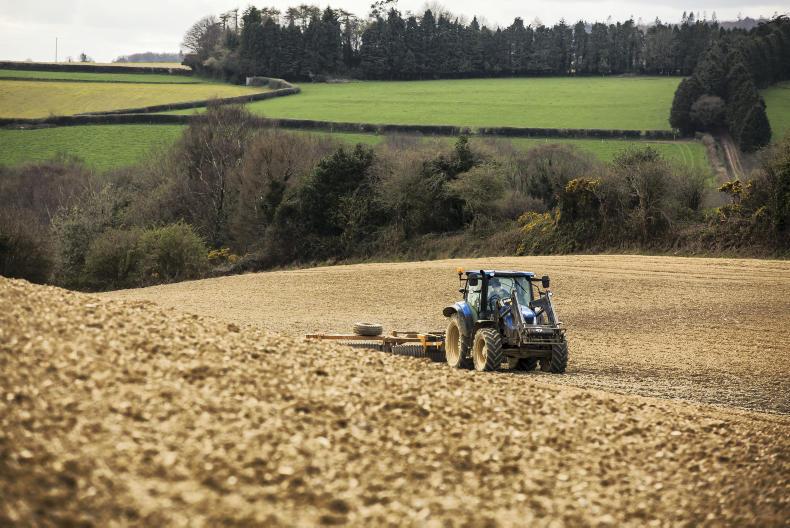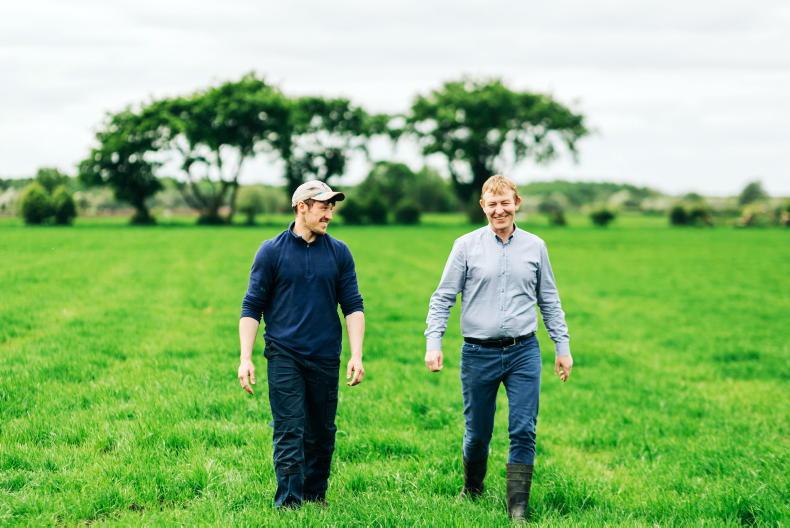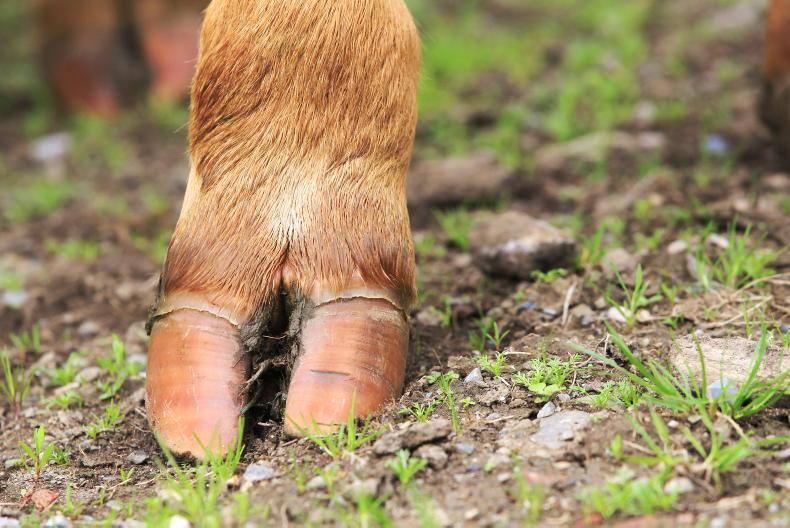Long-term leasing has been one of the most popular options taken by landowners interested in stepping back from farming, according to the Land Mobility Service programme manager Austin Finn.
“It is a very effective way of giving some certainty to both parties,” he said.
Long-term leasing involves renting land over a number of years at an agreed fixed price.

Austin Finn, Land Mobility Service.
It is a popular option for both lessors (the landowners) and lessees (people leasing the land) because when a contract is formed both can plan ahead with a greater degree of certainty.
This is advantageous rather than trying to make arrangements year after year on a short-term, uncertain basis. Austin summarised the benefits for both parties and also some points to consider:
Landowner
There are tax exemptions for the income generated from the long-term lease.When the right person is selected to lease the land, there is a good degree of income security and certainty. A good farmer will likely maintain the farm well or even improve it. Long-term leasing agreements tend to be clean and simple.The landowner can make some stipulations in the lease so that they can have some input if there is infrastructure work planned. Landowners wishing to step back can opt to lease part of their farm and continue to farm the remainder themselves.Leasing does not suit all landowners as they may not be ready to retire or might want to stay involved. There are other options for these farmers, such as share-farming or contract-rearing.Lessee
Access to land for a definite period at a known cost is a great benefit for someone leasing land. It provides certainty, allowing an operator to develop their farm business. A sustainable farm business cannot be developed around conacre.Where investment is required, be that on your own or the leased farm, it is important that the lease duration is sufficiently long to justify same. In reality, five years is too short in most cases.Long-term leasing agreements tend to be clean and simple.The main reason why leases break down is when the rent is not realistic (either way). Before finalising a price, it is important that you do your budgets and know your cost of production.Your record in managing/caring for the farm and how you honoured previous agreements is very important when looking to extend leases or enter new leases. Young farmers, new entrants and small operators can find themselves at a disadvantage when considering a significant lease. Established operators tend to be best positioned to have the finance required to cover stock, investments, inputs and the rent.Tax exemptions
According to Revenue, the lessor may claim income tax relief on certain income that they earn from the long-term leasing of their farmland. Revenue says you cannot lease your land to a close relative and claim the relief.
For your lease to qualify, your lease must be:
In writing or evidenced in writing.For a definite term of five years or more.For the purpose of working the land with the aim of taking produce from the land. For example, normal farming, market gardening, horse breeding, cattle dealing or fruit growing.The lessee cannot be connected to the lessor. If the lessee is a company, it cannot be under the control of you or any person connected to you. The lessee must use the leased land for the purpose of carrying on a farming trade. The profit from the letting of the farmland is assessed by Revenue as rental income. This relief is given as a reduction (up to a maximum limit) of your total taxable rental income. Your tax relief is subject to a maximum reduction as outlined in Table 1. You will only qualify for one reduction, regardless of the number of qualifying leases you may have.
Lessees can claim stamp duty relief on leases of six years or more. This is a new development. Prior to 1 August 2018, all land lease agreements which comprise a written document were liable for stamp duty.
To avail of the relief now in place, the lessees must meet the following criteria:
Have a relevant agricultural qualification (or get the qualification within a period of four years from the date of execution of the lease);Or
Spend at least 50% of their normal working time on the farm (Revenue defines this as a minimum of 20 hours working on the farm a week, averaged over a year).If this criteria is not met, the lessee would have to pay stamp duty at 1% of the annual rent.
Contract
The Irish Farmers Association (IFA) has developed a master lease for agricultural land. It is a useful template that farmers can follow to draw up their own lease agreements. The IFA says this template should only be taken as a guide and legal advice should be sought before signing an agreement. A good lease agreement is essential to cover all the particulars including the owner’s obligations and the farmer’s obligations. It also outlines what should happen in the event of a dispute between the parties.
Entitlements
Austin says most landowners lease their entitlements to the farmers who are leasing their land. The farmer will then reimburse the landowner with the Basic Payment Scheme (BPS) payment when it arrives in the autumn.
Long-term leasing has been one of the most popular options taken by landowners interested in stepping back from farming, according to the Land Mobility Service programme manager Austin Finn.
“It is a very effective way of giving some certainty to both parties,” he said.
Long-term leasing involves renting land over a number of years at an agreed fixed price.

Austin Finn, Land Mobility Service.
It is a popular option for both lessors (the landowners) and lessees (people leasing the land) because when a contract is formed both can plan ahead with a greater degree of certainty.
This is advantageous rather than trying to make arrangements year after year on a short-term, uncertain basis. Austin summarised the benefits for both parties and also some points to consider:
Landowner
There are tax exemptions for the income generated from the long-term lease.When the right person is selected to lease the land, there is a good degree of income security and certainty. A good farmer will likely maintain the farm well or even improve it. Long-term leasing agreements tend to be clean and simple.The landowner can make some stipulations in the lease so that they can have some input if there is infrastructure work planned. Landowners wishing to step back can opt to lease part of their farm and continue to farm the remainder themselves.Leasing does not suit all landowners as they may not be ready to retire or might want to stay involved. There are other options for these farmers, such as share-farming or contract-rearing.Lessee
Access to land for a definite period at a known cost is a great benefit for someone leasing land. It provides certainty, allowing an operator to develop their farm business. A sustainable farm business cannot be developed around conacre.Where investment is required, be that on your own or the leased farm, it is important that the lease duration is sufficiently long to justify same. In reality, five years is too short in most cases.Long-term leasing agreements tend to be clean and simple.The main reason why leases break down is when the rent is not realistic (either way). Before finalising a price, it is important that you do your budgets and know your cost of production.Your record in managing/caring for the farm and how you honoured previous agreements is very important when looking to extend leases or enter new leases. Young farmers, new entrants and small operators can find themselves at a disadvantage when considering a significant lease. Established operators tend to be best positioned to have the finance required to cover stock, investments, inputs and the rent.Tax exemptions
According to Revenue, the lessor may claim income tax relief on certain income that they earn from the long-term leasing of their farmland. Revenue says you cannot lease your land to a close relative and claim the relief.
For your lease to qualify, your lease must be:
In writing or evidenced in writing.For a definite term of five years or more.For the purpose of working the land with the aim of taking produce from the land. For example, normal farming, market gardening, horse breeding, cattle dealing or fruit growing.The lessee cannot be connected to the lessor. If the lessee is a company, it cannot be under the control of you or any person connected to you. The lessee must use the leased land for the purpose of carrying on a farming trade. The profit from the letting of the farmland is assessed by Revenue as rental income. This relief is given as a reduction (up to a maximum limit) of your total taxable rental income. Your tax relief is subject to a maximum reduction as outlined in Table 1. You will only qualify for one reduction, regardless of the number of qualifying leases you may have.
Lessees can claim stamp duty relief on leases of six years or more. This is a new development. Prior to 1 August 2018, all land lease agreements which comprise a written document were liable for stamp duty.
To avail of the relief now in place, the lessees must meet the following criteria:
Have a relevant agricultural qualification (or get the qualification within a period of four years from the date of execution of the lease);Or
Spend at least 50% of their normal working time on the farm (Revenue defines this as a minimum of 20 hours working on the farm a week, averaged over a year).If this criteria is not met, the lessee would have to pay stamp duty at 1% of the annual rent.
Contract
The Irish Farmers Association (IFA) has developed a master lease for agricultural land. It is a useful template that farmers can follow to draw up their own lease agreements. The IFA says this template should only be taken as a guide and legal advice should be sought before signing an agreement. A good lease agreement is essential to cover all the particulars including the owner’s obligations and the farmer’s obligations. It also outlines what should happen in the event of a dispute between the parties.
Entitlements
Austin says most landowners lease their entitlements to the farmers who are leasing their land. The farmer will then reimburse the landowner with the Basic Payment Scheme (BPS) payment when it arrives in the autumn.











SHARING OPTIONS